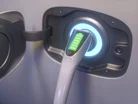Could a scratched battery be an insurance total wipeout?

An unfortunate fact about electric vehicles (EVs) is that in many respects they are more expensive than their petrol and diesel counterparts. This is due to a combination of factors, mainly attributing to their manufacturing costs and supply vs demand. However, a lesser-known factor appears to be that in many cases EVs are also more expensive to insure than regular passenger vehicles.
These higher premiums are due to more expensive parts, and less time on the road meaning a lack of data on accident statistics, but most worryingly is that EVs are far more likely to be written-off after an accident than vehicles with internal combustion engines (ICEs). All of these factors add up to a bad risk in the eyes of insurers.
So, what’s the problem here? Theoretically, a vehicle powered by an electric motor should be simpler than an ICE and therefore easier to repair, but evidence shows this just isn’t the case.
Things aren’t always that simple
The higher repair costs are part and parcel with the reason that EVs are more expensive to buy in the first place, which is more specialised parts that cost more to manufacture. Up to 50% of the manufacturing cost of an EV comes from the battery alone, and with cars depreciating by the same percentage after the sale, it is no wonder that a replacement battery would write off the vehicle in one fell swoop.
Another unfortunate issue is that, while outwardly the same, electric motors require far different mechanics from cars powered by ICEs meaning there are a host of new design problems that need to be addressed. Most notably, to house batteries that are powerful enough to make electric cars viable, requires the cars to bear significantly more weight. In order to balance this weight, manufacturers are forced to spread the components around the vehicle. Tesla for instance has opted for structural batteries in their newer models, which have been described as having ‘zero repairability’ when damaged.
Even if repairs were simple and affordable, there is a lack of available data coming from original equipment manufacturers (OEMs) regarding parts. This lack of visibility means insurers are unable to fully sign-off repairs as safe, so unwilling to risk a lawsuit, they would prefer to scrap vehicles instead. Some OEMs have tried to alleviate this problem by offering their own insurance products to lower costs for consumers, but lack of meaningful data still leads to higher premiums for everyone.
Though manufacturers argue that the enhanced operating capabilities included with the newer electric vehicles actually makes accidents less common, if those few accidents still result in a total write-off, that is a huge problem.
What does this mean for EVs?
This isn’t all doom and gloom for the emerging EV market, but more a sign that this technology is still in its infancy. All new technologies require testing phases, which inevitably lead to better innovations in the future. Cars of today have infinitely better operational and safety features than they did even at the turn of the century. Improvements that all came from use cases and data gathered from earlier models.
The biggest concern here is the continued lack of transparency from car manufacturers when it comes to their technology. It stands to reason that OEMs would be unwilling to reveal trade secrets at such a competitive stage of this emerging market. However, without data and insights from manufacturers, it is difficult for related industries, such as mechanics or insurance providers, to understand how EVs can be adequately covered for repairs.
Though expensive insurance premiums, and the unacceptable waste of scrapping low-mileage cars, seem like huge hurdles to overcome in the necessary move towards electrification, this will not be the case forever. EV is still operating under training wheels, mistakes will be made, but eventually the technology will be perfected and we’ll wonder why we ever used anything else.

